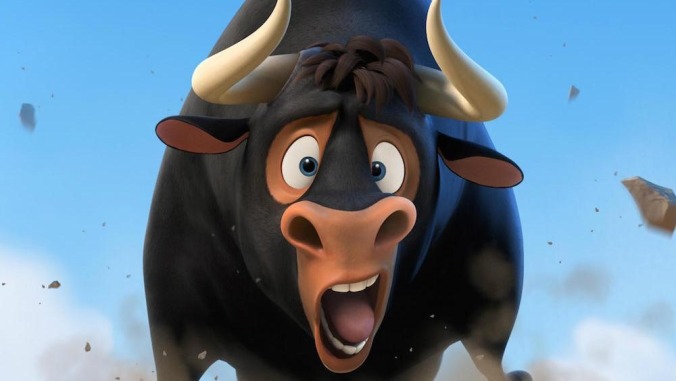The mediocre Ferdinand mostly fails to bring a beloved kid-lit bestseller to life

The children’s book The Story Of Ferdinand was a commercial success upon publication in 1936, outselling Gone With The Wind to become the No. 1 bestseller in the United States. Written by Munro Leaf and illustrated by Robert Lawson, the book follows a peaceful bull who would rather smell flowers than battle matadors, garnering the ire and confusion of Spain in the process. At the time, many read The Story Of Ferdinand as a political allegory and thought it promoted nefarious values: It was famously banned in Spain after supporters of Francisco Franco believed it to be a pacifist tract; Hitler burned copies of the book, calling it “degenerate democratic propaganda”; and others thought it embodied fascism, communism, and other violent, disreputable political ideologies. Although Leaf has said that his book was merely “propaganda for laughter,” The Story Of Ferdinand’s nonviolent philosophy has at least something to do with its enduring legacy. After all, not every children’s book was given out for free in Germany to promote peace following the country’s defeat in the war.
The best thing that can be said about Ferdinand, Blue Sky Studios’ extremely loose adaptation of Munro’s book, is that it tries to advocate for the same values as the source material, albeit by way of “Just be yourself!” pabulum that’s part and parcel with many kids movies. The plot, such as it is, allows for Munro’s viewpoint to shine amid the various irritations the film puts its audience through. After a young Ferdinand learns that his father has been killed in the ring, he escapes the fight-or-die bull training camp of his youth only to be picked up by a father-daughter duo who bring him to live on their farm. The years pass and Ferdinand grows into a strapping bull (voiced by an affable enough John Cena), but sure enough, society’s perceptions of his menace outweigh evidence of his gentle personality. He’s hauled back to the camp after an incident involving a bee and Ferdinand in a china shop (the film’s most inspired, but nevertheless obvious sight gag), where he must put his principles to the test to save himself and the other bulls in the camp.
Ferdinand’s most saccharine moments end up being its most potent, even if they’re often more cloying than emotional. When a young Ferdinand meekly asks his father if it’s okay that they don’t share the same dream to fight, his measured but defeated response about “the world not working like that” rings true in its shortsightedness. Later, Ferdinand comforts a fellow bull crying about his friend being sent away to a chophouse, essentially telling him that it’s normal to express emotions other than aggression. But Ferdinand’s best moment comes when the gentle bull finally enters the ring: His gesture of peace in the face of violence has legitimate juice, so much so that it’s a shame the film only knows merely how to handle the moment rather than amplify it.
While socially conscious adults in the audience will pick up on Ferdinand’s pointed jabs at toxic masculinity and social prejudice, they will likely be bored stiff by the general mediocrity—and so might their kids. The one-note, start-and-stall narrative feels especially prolonged, perhaps to justify a feature-length adaptation of a heavily illustrated book, or most likely to include as many half-baked chase or fight sequences as possible. Furthermore, the film is almost devoid of humor beyond the occasional funny face or well-executed line (Ferdinand’s insistence that haughty, condescending German horses are the height of comedy scans as an inside joke gone awry). Then there’s Blue Sky’s blandly colorful computer animation, which has barely evolved since the premiere of Ice Age 15 years ago; although the studio succeeds at rendering landscapes with painterly composition, everything else is a grab bag of vague, oppressively bright images that say as little as possible. Even the voice acting, often a pleasant showcase in these affairs, leaves a lot to be desired, with the possible exception of Kate McKinnon, whose own shtick stands out mostly because it’s in sharp contrast to the film’s vibe.
Faced with familiar story tropes and lowest-common-denominator bids for attention, anyone over the target demographic might ask themselves a multitude of questions as the mind inevitably wanders. Some might be fairly benign: “Is that Peyton Manning voicing a bull whose primary trait is self-sabotage?” or “Could Blue Sky not afford either the Rolling Stones or Soup Dragons’ version of ‘I’m Free’ so they settled for Pitbull’s ‘Freedom,’ which just samples the chorus?” Others could be slightly graver, like, “Is Ferdinand’s non-violent agenda at odds with its implied belief that society’s elites have largely rigged existence to be an endless catch-22?” But the most suitable question is certainly, “Why settle for a tired Fox Animation movie when a Pixar film is playing right next door?”